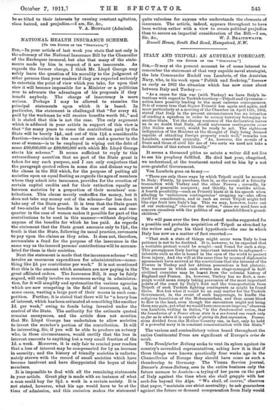NATIONAL HEALTH INSURANCE SCHEME. [To ma EDITOR or TEE "SPECTATOR. "]
Sns,—In your article of last week you state that not only is the advocacy of the National Insurance Bill by the Chancellor of the Exchequer immoral, but also that many of the state- ments made by him in re-speot of it are inaccurate. As regards the former charge, I think Mr. Lloyd George may safely leave the question of his morality to the judgment of other persons than your readers if they are expected seriously to entertain the point of view which you take, for upon that view it will become impossible for a Minister or a politician ever to advocate the advantages of his proposals if they benefit anybody. The charge of inaccuracy is more serious. Perhaps I may be allowed to examine the principal statements upon which it is based. In particular, the statement is challenged that "for every 4d. paid by the workman he will receive benefits worth 9d.," and it is stated that this is not the case. The only argument which is adduced in your article in support of this view is that "for many years to come the contribution paid by the State will be barely ltd., and out of this lid. a considerable fraction—two-ninths in the case of men and a quarter in the case of women—is to be employed in wiping out the debt of some £60,000,000 or £80,000,000 with which Mr. Lloyd George starts his scheme." It seems sufficient to reply to this extraordinary assertion that no part of the State grant is taken for any such purpose, and I can only conjecture that the paragraph quoted refers in some dim and distant way to the clause in the Bill which, for the purpose of putting all societies upon an equal footing as regards the ages of members whom they admit into insurance, provides for the creation of certain capital credits and for their extinction equally as between societies by a proportion of their members' con- tributions. This clause merely reshuffles the money, but it does not take any money out of the scheme—far less does it take any of the State grant. It is true that the State grant of two-ninths of the benefits in the case of men and one- quarter in the case of women makes it possible for part of the contributions to be used in this manner—without depriving anyone of the benefits for which he has paid. As regards the statement that the State grant amounts only to lid., the truth is that the State, following its usual practice, covenants to pay upon the claims as they arise. It does not, therefore, accumulate a fund for the purpose of the insurance in the same way as the insured persons' contributions will be accumu- lated for them in their societies.
Next the statement is made that the insurance scheme " will involve an enormous expenditure for administration—some- thing like Id. per contributor per week." It is not mentioned that this is the amount which members are now paying in the great affiliated orders. The Insurance Bill, it may be fairly argued, will really involve an enormous saving in administra- tion, for it will simplify and systematize the various agencies which are now competing in the field of insurance, and, in some cases, wasting a large part of their means in such com- petition. Further, it is stated that there will be "a heavy lose of interest, which has been estimated at something like another ld. per week," owing to funds being invested under the control of the State. The authority for the estimate quoted remains anonymous, and the article does not mention that Mr. Lloyd George has undertaken to allow societies to invest the member's portion of the contribution. It will be interesting, Sir, if you will be able to produce an actuary who, in these circumstances, would certify that the loss in interest amounts to anything but a very small fraction of the id. a week. Moreover, it is only fair to remind your readers that a loss of interest may be compensated for by an increase in security; and the history of friendly societies is unfortu- nately strewn with the record of small societies which have become insolvent and have disappointed the hopes of their members.
It is impossible to deal with all the remaining statements in your article. Great play is made with an instance of what a man could buy for 94d. a week in a certain society. It is not stated, however, what his age would have to be at the time of admission, and this omission makes the statement quite valueless for anyone who understands the elements of insurance. The article, indeed, appears throughout to have been written rather with a view to create political prejudice than to secure an impartial consideration of the Bill.—I am,






























































 Previous page
Previous page